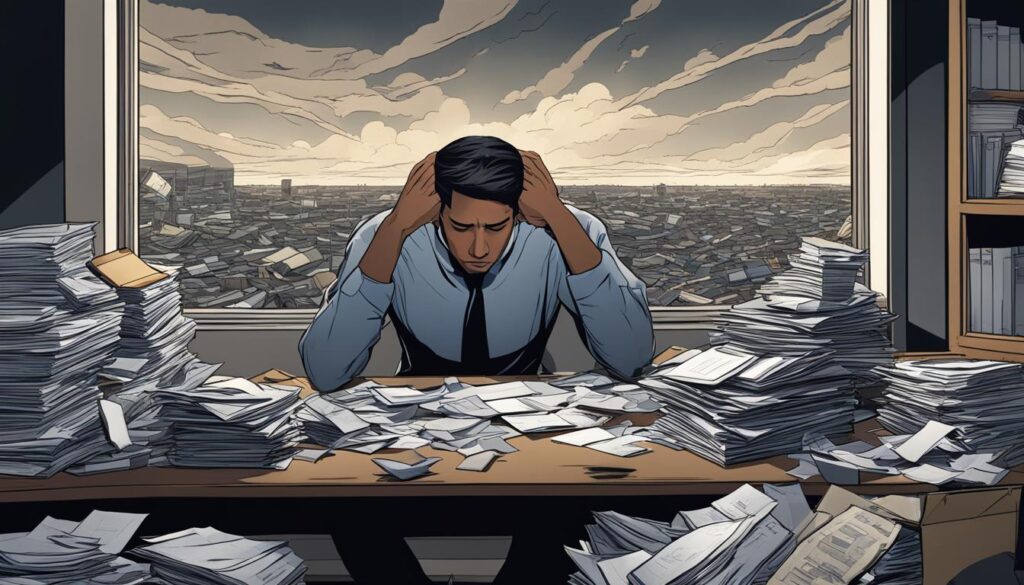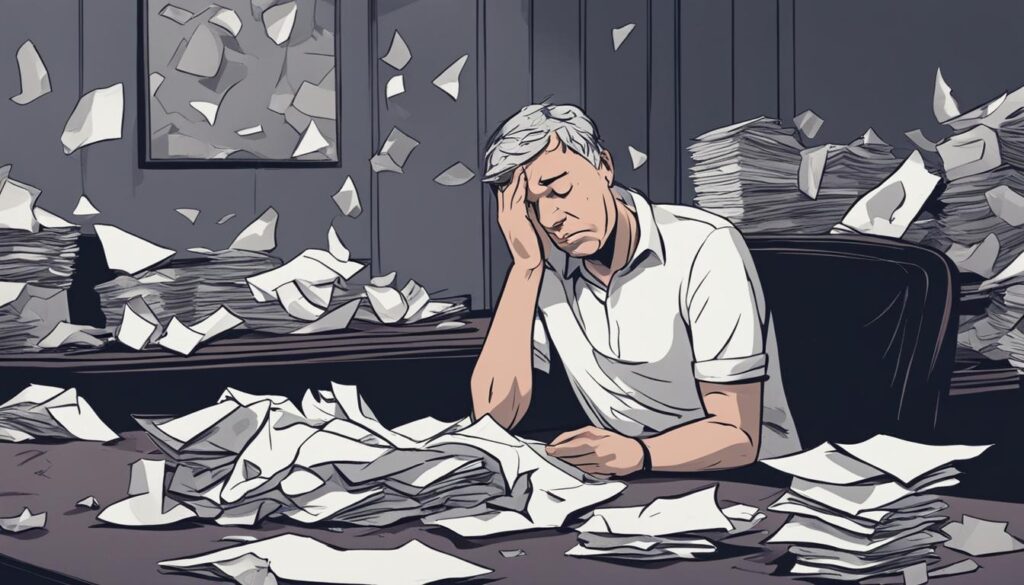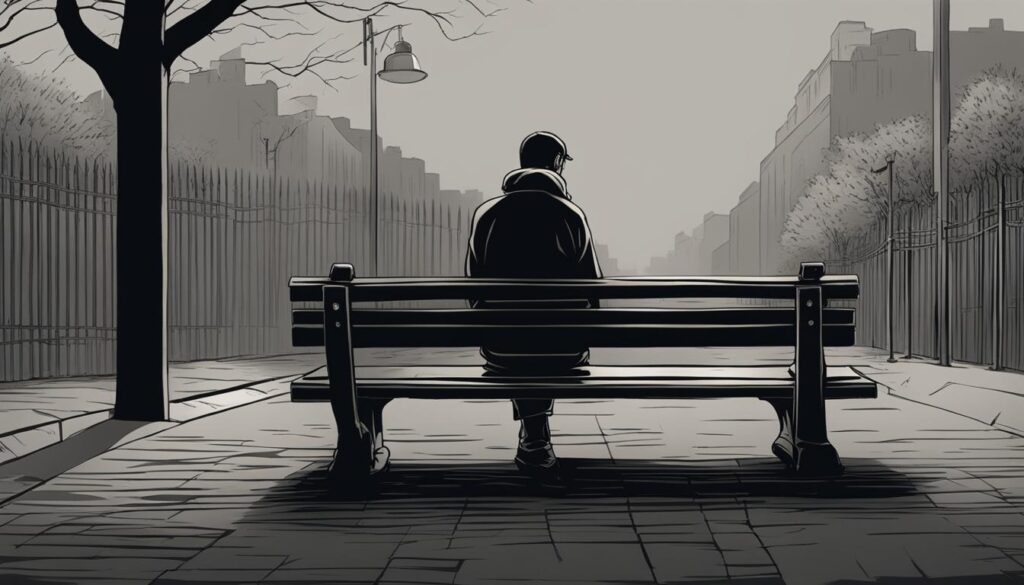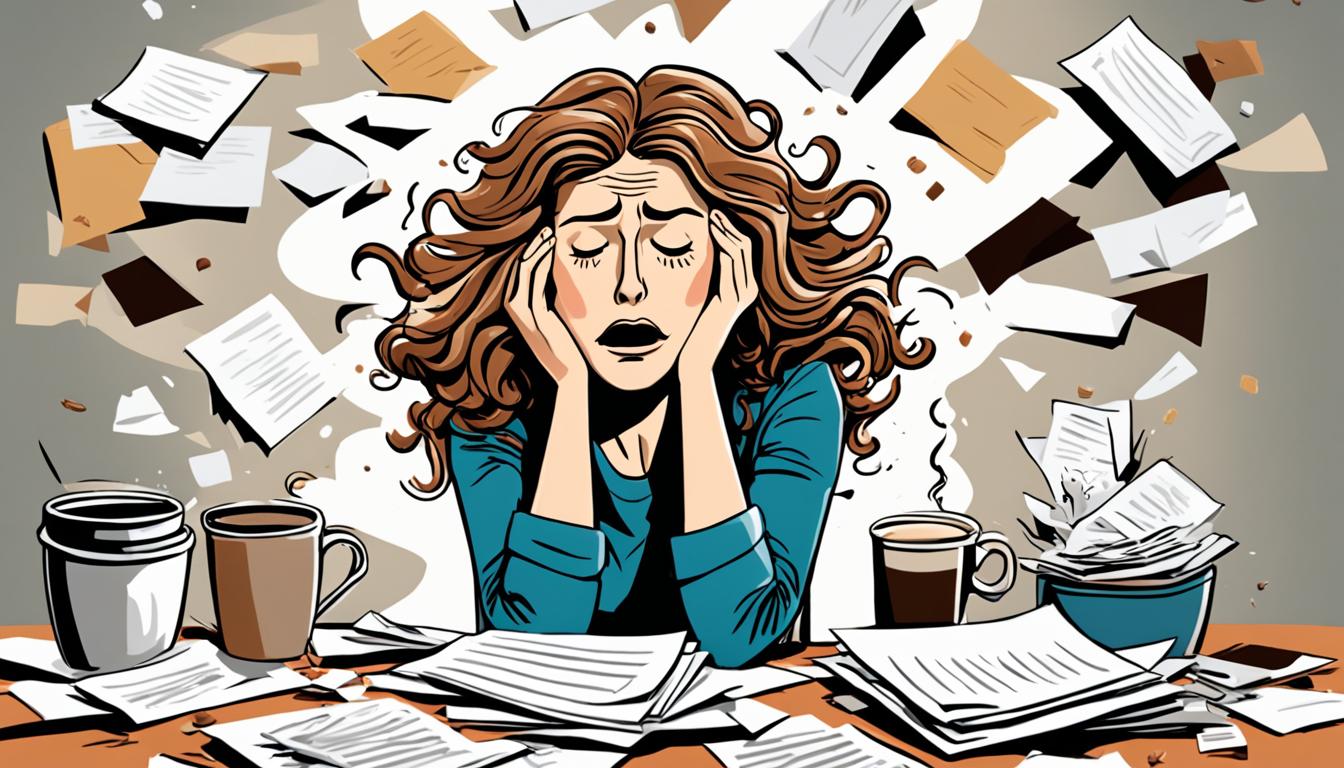8 Warning Signs You Are Mentally Exhausted and How to Recover
Do you often feel overwhelmed, stressed, and tired? Maybe it’s getting hard to handle daily tasks. These could be signs of mental exhaustion, also called burnout. It can really impact how you feel and live your life.
This article will show you signs of being mentally exhausted and ways to get better. Learning these signs and finding ways to fix them can put you back in control. You can get your mental health back on track and find balance again.
So, what shows that you’re mentally exhausted? And how do you get over it? Let’s take a closer look and figure it out.
Lack of Motivation
Feeling mentally tired often means you lose motivation.
Things you used to love doing might now feel like chores. It’s hard to find the energy and new ideas to get them done. This can affect your life at home and work.
Without motivation, it’s tough to get things done. You might find simple tasks harder than they should be. Everything may feel like it’s too much to handle. This can make you less productive and efficient.

It’s important to see how being mentally drained affects your drive. Taking time to rest and relax is crucial for your health. Rest helps your mind and body recharge. It opens a door for new inspiration too.
- Start by prioritizing self-care and scheduling regular breaks.
- Engage in activities that bring you joy and help you recharge.
- Explore new hobbies or artistic pursuits that can reignite your creativity.
- Set realistic goals and break them down into smaller, manageable tasks.
- Seek support from loved ones or consider professional help if needed.
Tackling your motivational slump head-on can renew your purpose, boost your work, and bring back your creativity. It’s fine to reach out for help and put your mental wellness first.
Irritability
Mental exhaustion often makes us more irritable. When we’re mentally drained, even small comments or questions that don’t usually bother us can cause frustration. Feeling constantly overwhelmed might lead us to isolate ourselves from others.
Taking some alone time can improve our mood. It gives us a chance to recharge and feel calmer. This break can help reduce irritability.

Insomnia
Mental exhaustion can mess up our sleep, leading to insomnia.
When our minds won’t slow down, falling asleep gets tough. It’s a cycle that feeds on itself, making us feel even more tired. To sleep better, step away from what’s stressing you out.
Getting into a bedtime routine is key if exhaustion is keeping you up.
Try doing calming things before bed, like reading or soaking in a warm bath. Make your sleep space calm and comfy, without any distractions.
Techniques like deep breathing or meditation can calm your thoughts before sleep. Taking care of yourself and knowing when to take breaks is also important. Don’t forget that getting good sleep is vital for feeling less tired during the day.

Anxiety
Feeling mentally tired can often make you more anxious.
This can lead to being restless, upset, and having trouble sleeping. These feelings can grow into panic attacks, making you feel like things are too much. It’s okay to feel stressed or anxious; everyone does sometimes.
There are ways to help with anxiety. Doing calming activities is key.
Try things like deep breathing, focusing on the present moment, or hobbies you enjoy. Taking time off to care for yourself is also important.

Excessive Worrying
Feeling mentally tired can mean you worry a lot and get really sensitive. When you’re worn out, even comments meant to help might make you cry. It’s key to see these signs and find ways to get back your emotional balance.
Taking a break from the things that stress you can really help with excessive worrying.
Giving yourself some space can lower how much you fret and let you recharge. Doing calming activities like meditation or deep breathing can also help and make you feel more stable.
It’s important to know that worrying too much is a sign of being mentally worn out. It doesn’t mean you’re weak. Recognizing your emotions and being kind to yourself can help get you through this tough time. It helps you find peace and feel better.
Don’t forget that looking after your mind is just as crucial as looking after your body. If you’re worrying too much and it’s getting in the way of your life, reach out for help from people you trust or professionals. They can offer support and guidance.
Recovering from Excessive Worrying:
- Recognize when you’re worrying too much and feeling mentally tired.
- Take time away from what stresses you to relax and rest.
- Do things that make you calm, like meditation, or deep breathing.
- Be kind to yourself and know you can overcome this excessive worry.
- Get help from family, friends, or professionals if you need it.

Difficulty Concentrating
Mental fatigue can really mess with how well our brains work.
It makes tasks hard to focus on. Feeling tired in your mind makes you easily lose your thoughts and not finish what you started. This is true even for easy things, which makes you less productive and could cause you to miss deadlines.
The key is to know when you need to take a break to get back on track.
If staying focused is tough, it’s crucial to pause and let your mind reset. Doing things that help you relax and think clearly is vital.
This could be as simple as taking quick breaths or trying techniques that help you stay in the present, like mindfulness. Also, doing stuff you enjoy can make a big difference. These habits will make concentrating easier and boost how well you work.
Feeling Hopeless
When you’re really tired, feeling hopeless is pretty common.
It’s like everything looks dark and impossible. But, it’s crucial to know that this state isn’t forever. It’s often because you’re mentally drained, not because everything’s really as bad as it seems.
If hopelessness hangs around a lot, it might be a serious sign of depression. In that case, getting professional help is smart. Talking to someone who knows how to help can make a big difference. It shows strength, not weakness, to reach out for your mental health.
Talking to a mental health expert can really turn things around. They’ve got ways to help you see the light again. They can share tricks and tips to push you back on track. You’ll start feeling like you have a place in this world again.
Remember, lots of people want to see you happy. If hope just seems far away, pick up the phone. Take that first step back towards finding happiness and drive.

Forming Unhealthy Habits
Mental exhaustion greatly affects your health, leading to bad habits.
One such habit is using substances more. When tired, you might start using substances to deal with stress and anxiety.
Being tired makes stress worse. It also weakens your willpower. This makes fighting off bad habits harder. Substances like alcohol and drugs can briefly make you feel better. But, they can harm you in the long run and lead to addiction.
To avoid these habits, look for healthier ways to cope. Instead of substances, try activities that calm you. Things like mindfulness, deep breathing, or fun hobbies can help.
Getting support from friends or professionals is also crucial. They can give you new ways to handle stress. Having people who support you makes a big difference.

It takes time and kindness to leave bad habits behind. Commit to better ways of coping and ask for help. You can beat these habits and improve your mental health.
Strategies for Recovery
To recover from mental exhaustion, start by taking good care of yourself.
Look for support where you need it. By changing little things in your life and using mindfulness, you can start feeling better.
Here are some tips:
- Eliminate Stressors: Find the things that stress you out and get rid of them. You might need to set limits, share tasks, or rearrange your duties to lessen stress.
- Practice Mindfulness: Try to be more in the moment every day. Pause and think, do things you enjoy, and find peace in them.
- Connect with Trusted Friends: Talk to friends who understand you. They can offer support and listen to your thoughts and feelings. Remember, you’re not alone in this.
- Seek Professional Help: If you’re still feeling exhausted and overwhelmed, talk to a mental health expert. They have the knowledge and tools to help you get better.
Also, try to change some of your daily routines to handle stress and anxiety better. Make sure you take care of yourself and do things that help you relax and feel better.
Recovery is different for everyone. What helps others might not be right for you. Stay patient and be happy about every step you take towards feeling better.
Conclusion
Looking after your mental health is key to feeling good. When you spot signs like feeling down, getting mad easily, or not being able to sleep, act fast. It’s important to pay attention and react.
By caring for yourself and getting help, you can feel better. This means changing some habits, using relaxation methods, and talking to people you trust or professionals. It’s fine to reach out for help.
Keeping mentally fit takes work every day. Learn how to lower stress and worry. Put yourself first, be kind to yourself, and get the help you need. This way, you can bounce back and stay mentally strong.







